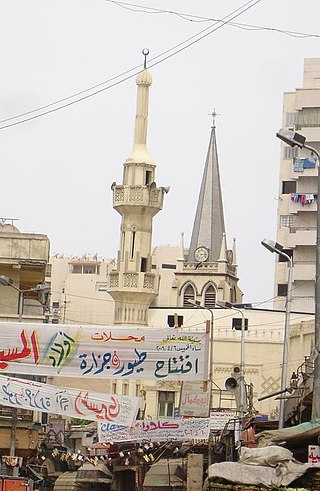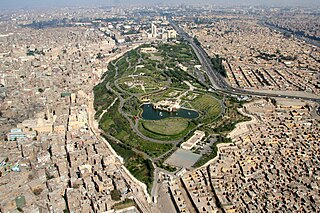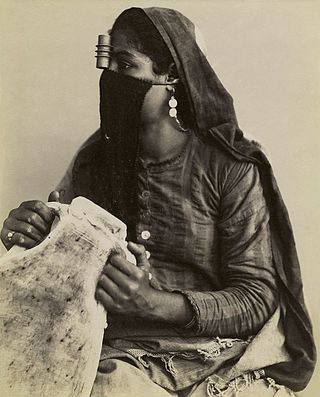Related Research Articles

The Al-Azhar University is a public university in Cairo, Egypt. Associated with Al-Azhar Al-Sharif in Islamic Cairo, it is Egypt's oldest degree-granting university and is known as one of the most prestigious universities for Islamic learning. In addition to higher education, Al-Azhar oversees a national network of schools with approximately two million students. As of 1996, over 4,000 teaching institutes in Egypt were affiliated with the university.

Yusuf al-Qaradawi was an Egyptian Islamic scholar based in Doha, Qatar, and chairman of the International Union of Muslim Scholars. His influences included Ibn Taymiyya, Ibn Qayyim, Sayyid Rashid Rida, Hassan al-Banna, Abul Hasan Ali Hasani Nadwi, Abul A'la Maududi and Naeem Siddiqui. He was best known for his programme الشريعة والحياة, al-Sharīʿa wa al-Ḥayāh, broadcast on Al Jazeera, which had an estimated audience of 40–60 million worldwide. He was also known for IslamOnline, a website he helped to found in 1997 and for which he served as chief religious scholar.

Cairo University is Egypt's premier public university. Its main campus is in Giza, immediately across the Nile from Cairo. It was founded on 21 December 1908; after being housed in various parts of Cairo, its faculties, beginning with the Faculty of Arts, were established on its current main campus in Giza in October 1929.
Liberalism in Egypt or Egyptian liberalism is a political ideology that traces its beginnings to the 19th century.
Sheikh Mohammed Aboulkhair Zaki Badawi, KBE, GCFO was a prominent Egyptian Islamic scholar, community activist, and promoter of interfaith-dialogue. He was the principal of the Muslim College in London, which he founded in 1986. He also was a frequent writer and broadcaster on Islamic affairs.
Muhammad Habib Shakir was an Egyptian judge, born in Cairo and a graduate from Al-Azhar University.

Ekmeleddin Mehmet İhsanoğlu is a Turkish chemistry and science history professor, academician, diplomat and politician who was Secretary-General of the Organisation of Islamic Cooperation (OIC) from 2004 to 2014. He is also an author and editor of academic journals and advocate of intercultural dialogue.

Religion in Egypt controls many aspects of social life and is endorsed by law. The state religion of Egypt is Islam, although estimates vary greatly in the absence of official statistics. Since the 2006 census religion has been excluded, and thus available statistics are estimates made by religious and non-governmental agencies. The country is majority Sunni Muslim, with the next largest religious group being Coptic Orthodox Christians. The exact numbers are subject to controversy, with Christians alleging that they have been systemically under-counted in existing censuses.

The International Islamic University (IIU) is an Islamic public university located in Islamabad, Pakistan. It was established in 1980 and restructured in 1985, and remains a valuable source for Higher Education in Pakistan. The university is regularly listed among the most recognized universities and prestigious degree awarding institutions of Pakistan by the Higher Education Commission of Pakistan.

Al-Azhar Park is a public park located in qism al-Darb al-Ahmar, in Historic Cairo, Egypt.
The Egyptian identification card controversy is a series of events, beginning in the 1990s, that created a de facto state of disenfranchisement for Egyptian Baháʼís, atheists, agnostics, and other Egyptians who did not identify themselves as Muslim, Christian, or Jewish on government identity documents.

Ahmed Subhy Mansour is an Egyptian American activist and Quranist scholar dealing with Islamic history, culture, theology, and politics. He founded a small Egyptian Quranist group that is neither Sunni nor Shia. In 1987, he was fired from Al-Azhar University after expressing his Quranist views. One of his fellow Islamic scholars at Al-Azhar University, Sheikh Jamal Tahir, took up the same Quran alone stance. Mansour was exiled from Egypt, and lives in the United States as a political refugee. In the United States, he established the Ahl-Alquran website.

Chinese people in Egypt form one of the smaller groups of overseas Chinese; however, they are a very diverse community with a history reaching back for over a century.

Al-Azhar Mosque, known in Egypt simply as al-Azhar, is a mosque in Cairo, Egypt in the historic Islamic core of the city. Commissioned as the new capital of the Fatimid Caliphate in 970, it was the first mosque established in a city that eventually earned the nickname "the City of a Thousand Minarets". Its name is usually thought to derive from az-Zahrāʾ, a title given to Fatimah, the daughter of Muhammad.

Muhammad Metwalli al-Sha'rawi was an Islamic scholar, former Egyptian minister of Endowments and Maliki jurist. He has been called one of Egypt's most popular and successful Islamic preachers, and "one of the most prominent symbols of popular Egyptian culture" in the 1970s, 1980s and 1990s.

In a predominantly Muslim society, as many as 90% of women in Egypt have adopted a form of veiling. A majority of Egyptian women cover at least their hair with the hijab. A hijab refers to a head covering that is worn by Muslim women. Although the phenomenon of wearing the niqāb, a veil which covers the face is not as common, the niqab in Egypt has become more prevalent. While a few women in Egypt wear a black niqab along with a billowing black abaya as seen in countries such as Saudi Arabia, many choose to wear different colors of the niqab or manipulate the hijab to cover their face. Regardless, the growing trend of munaqqabat, or women who wear the niqab, has alarmed the authorities. They have begun to see this dress as a security threat, because it hides the face, and because it is perceived as a political statement, a rejection of the state in favor of a strict Islamic system.
Sheikh Abdullah al-Sharqawi was an Egyptian writer and scholar of the Khalwati sufi order. He was known for being the Grand Imam of Al-Azhar during the French Campaign in Egypt and Syria, and for being one of the Leaders of the resistance against the French Occupation in Egypt, he was also one of the Three Leaders to crown Mehmet Ali Pasha in 1805.
The following is a timeline of the history of the city of Cairo, Egypt.
Mahmoud Zakzouk was an Egyptian politician and academic. He served as minister of religious endowment of Egypt from 1995 to 2011.
Mohammad Mahmoud Ghali was the Professor of Linguistics and Islamic Studies, Al-Azhar University, Cairo, Egypt. Ghali studied phonetics at the University of Exeter in the UK before obtaining his PhD in Phonetics from the University of Michigan. He spent 20 years interpreting the meanings of the Quran into English. He was author of an English translation of the Quran, Towards Understanding the Ever-Glorious Quran.
References
- General
- "Al Azhar English Training Centre". Official website of the British Embassy in Cairo. Retrieved 2011-03-30.
- Specific
- 1 2 Max de Lotbinière (4 April 2008). "Second language centre opens on Islamic campus". The Guardian Weekly . Retrieved 2011-03-30.
- ↑ "Bridging gaps and engaging others" (PDF). In Touch (21). British Council in Egypt: 7. May–June 2009. Archived from the original (PDF) on 2011-06-06. Retrieved 2011-03-30.